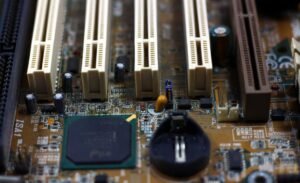How AI and Automation Are Changing the Nature of Work
Artificial Intelligence (AI) and automation technologies are revolutionizing industries and transforming the nature of work worldwide. As these technologies continue to advance, organizations are finding new and innovative ways to incorporate them into their operations, leading to increased efficiency, productivity, and cost savings.
Key Takeaways
- AI and automation have significant impacts on the nature of work.
- These technologies improve efficiency, productivity, and cost savings.
- Upskilling and adaptation to new technology are necessary for employees.
Businesses are increasingly using AI and automation to streamline processes and handle repetitive tasks, freeing up human workers to focus on more complex and creative aspects of their jobs. The integration of AI and automation in the workplace offers numerous benefits, but it also presents new challenges and considerations for both employers and employees.
The Transformative Power of AI and Automation
AI and automation technologies have the potential to transform multiple industries and change the way we work. In manufacturing, for example, robots can perform repetitive tasks with precision, consistency, and speed, resulting in improved production rates and reduced costs. In customer service, AI-powered chatbots can handle routine inquiries, allowing human agents to tackle more complex issues.
In the era of AI and automation, the roles of human workers are evolving, and new skill sets are becoming essential to thrive in the workforce. Jobs that require critical thinking, problem-solving, creativity, and emotional intelligence are becoming increasingly valuable, while repetitive and routine tasks are automated.
The Need for Upskilling and Adaptation
As AI and automation continue to reshape the job market, companies and individuals must prioritize upskilling and adaptation to remain competitive. Providing training and resources to help employees develop new skills is crucial for organizations to navigate this transformation successfully. At the same time, employees must be proactive in acquiring new skills to remain employable.
Upskilling and adaptation to new technologies such as AI is not only beneficial for individual employees but also crucial for the economic well-being of nations. Governments and educational institutions play a significant role in promoting training programs and initiatives that equip workers with the skills needed in the AI-driven economy.
Impacts Across Industries
The integration of AI and automation extends beyond manufacturing and customer service. Various sectors, including finance, healthcare, transportation, and agriculture, are experiencing significant impacts and transformations as a result of these technologies.
Let’s take a closer look at some data points highlighting the impacts of AI and automation across different industries.
| Industry | Impact |
|---|---|
| Finance | Automated trading algorithms have increased the speed and efficiency of financial transactions, but there are concerns regarding job displacement. |
| Healthcare | AI-powered diagnostic tools can assist doctors in interpreting medical images and analyzing patient data, leading to improved accuracy and faster diagnoses. |
Challenges to Address
While AI and automation offer numerous benefits, there are also challenges that need to be addressed to ensure a smooth transition into the future of work. These challenges include:
- The potential for job displacement and economic inequality.
- Ethical considerations surrounding AI decision-making and bias.
- The need for clear regulations and policies to govern the use of AI.
The Future of Work
AI and automation are undoubtedly changing the nature of work, requiring a shift in how individuals and organizations approach employment. Embracing these technologies and leveraging their capabilities can lead to increased productivity, efficiency, and innovation. However, it is crucial to address the challenges and ensure that the benefits of AI and automation are accessible to all.
As AI and automation continue to evolve, there is no doubt that adaptability and lifelong learning will be integral to thriving in the future of work.

Common Misconceptions
Misconception 1: AI and Automation Will Replace all Human Jobs
One common misconception surrounding AI and automation is that they will completely replace all human jobs. While it is true that AI and automation have the potential to automate certain tasks and roles, they are unlikely to completely eliminate the need for human workers.
- AI and automation can complement human skills and abilities.
- There will still be a need for human creativity, critical thinking, and problem-solving.
- New jobs and roles will emerge as a result of AI and automation.
Misconception 2: AI and Automation Will Lead to Mass Unemployment
Another misconception is that the rise of AI and automation will result in mass unemployment. While it is true that some jobs may become automated, there will still be a need for human workers in various industries.
- AI and automation can create new job opportunities and roles.
- Jobs may evolve rather than disappear, requiring workers to acquire new skills.
- AI and automation can free up human workers to focus on more complex and strategic tasks.
Misconception 3: AI and Automation Will Decrease Job Satisfaction
A common misconception is that AI and automation will lead to decreased job satisfaction due to the fear of job loss and decreased human interaction. However, studies have shown that the impact of AI and automation on job satisfaction is not universally negative.
- AI and automation can help eliminate tedious and repetitive tasks, leading to increased job satisfaction.
- Workers can be upskilled and assigned to more fulfilling and challenging roles with the help of AI and automation.
- AI and automation can facilitate more efficient and streamlined workflows, improving overall job satisfaction.
Misconception 4: AI and Automation Are Only Relevant to Certain Industries
Some people believe that AI and automation are only relevant to specific industries like manufacturing or technology. However, the impact of AI and automation extends far beyond these industries.
- AI and automation can be applied to healthcare, finance, transportation, and many other sectors.
- AI can help improve diagnosis accuracy in healthcare, while automation can streamline financial processes.
- Virtually all industries can benefit from AI and automation in terms of increased efficiency and productivity.
Misconception 5: AI and Automation Will Render Human Workers Useless
Lastly, a common misconception is that AI and automation will render human workers useless. However, human skills and abilities, such as emotional intelligence, creativity, and adaptability, will continue to be valuable and in demand.
- AI and automation can augment human capabilities, making individuals more effective in their roles.
- Human workers possess unique qualities that AI and automation cannot replicate, such as empathy and intuition.
- Collaboration between humans and AI can lead to more innovative and successful outcomes.

10 Ways AI and Automation Are Changing the Nature of Work
The rise of artificial intelligence (AI) and automation has brought about significant changes in various aspects of work. From speeding up processes to streamlining operations, these technologies have transformed industries across the globe. In this article, we explore ten key ways in which AI and automation are reshaping the nature of work.
Automation in Manufacturing
The implementation of automation in manufacturing has revolutionized the production process. Robots and machines can now perform repetitive tasks with high precision and efficiency, reducing the need for human labor.
AI-Powered Virtual Assistants
AI-powered virtual assistants have become increasingly prevalent in the workplace. These digital helpers assist with tasks such as scheduling, email management, and taking notes, allowing professionals to focus on more strategic and complex endeavors.
Automated Customer Service
AI-powered chatbots and automated customer service systems have transformed the way organizations handle customer inquiries. These systems can provide instant responses and gather relevant information, improving response times and streamlining customer support processes.
Robotic Process Automation
Robotic Process Automation (RPA) involves using software robots to automate repetitive and rule-based tasks. RPA can handle data entry, invoice processing, and other mundane activities, freeing up employees to work on more critical projects.
AI in Healthcare
The integration of AI in healthcare has led to groundbreaking advancements. AI algorithms can analyze medical records, assist in diagnosing diseases, and even predict patient outcomes, ultimately enhancing the quality of healthcare delivery.
Automated Data Analysis
AI and automation have significantly accelerated the process of data analysis. Advanced algorithms can quickly analyze vast amounts of data, providing valuable insights that inform decision-making and improve business outcomes.
Driverless Vehicles
The emergence of autonomous vehicles is transforming the transportation industry. From self-driving cars to delivery drones, these innovations have the potential to reshape logistics, improve safety, and optimize transportation networks.
AI-Powered Recruiting
AI technologies are revolutionizing the hiring process. Automated resume screening tools and AI-based interview systems help organizations identify qualified candidates efficiently, leading to more effective recruitment and improved talent acquisition.
Automation in Agriculture
AI and automation are making significant advancements in the agricultural sector. Robotic machinery can plant seeds, monitor crop health, and harvest produce, allowing farmers to increase productivity and reduce labor-intensive processes.
AI-Assisted Content Creation
AI algorithms can now generate content such as news articles, reports, and marketing materials. While human input is still necessary to refine and add creativity to these outputs, AI is speeding up the content creation process and expanding possibilities in various industries.
In conclusion, AI and automation are reshaping the nature of work across industries. These technologies streamline processes, improve efficiency, and enable professionals to focus on more complex tasks. As AI continues to advance, it will be crucial for organizations to adapt and leverage these technologies to stay competitive in the evolving landscape of work.
Frequently Asked Questions
How AI and Automation Are Changing the Nature of Work
What is AI (Artificial Intelligence) and how is it changing the nature of work?
How is automation impacting the job market?
What are the benefits of AI and automation in the workplace?
Is AI and automation a threat to job security?
How can AI and automation benefit businesses?
Are there ethical concerns related to AI and automation in the workplace?
How can employees and organizations prepare for the impact of AI and automation?
What are the limitations or challenges of AI and automation in the workplace?
Can AI and automation replace humans entirely in the future?
How can AI and automation contribute to a more inclusive and equitable workforce?





